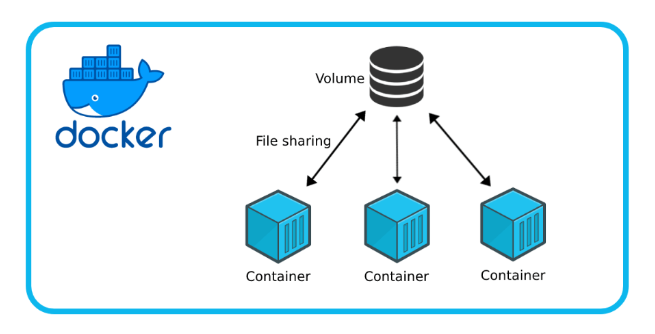The Power of Docker Volumes: From Data Sharing to Seamless Backups
 Chetan Mohanrao Mohod
Chetan Mohanrao Mohod
What is a Docker Volume?
Imagine you have a temporary storage box that vanishes every time you close it. This is how Docker containers usually work with their data: as soon as the container is stopped or removed, its data disappears. Now, let’s say you want to store important data from a container so that it’s still there even if the container is removed or restarted. Docker volumes are like a reliable storage box, where you can save data that containers can use and access even if they’re stopped or replaced.
In simpler terms, Docker volumes are like an external hard drive for your Docker containers, keeping your data safe and accessible across container lifecycles. They’re a handy solution for any scenario needing data persistence in a containerized environment.
Why Use Docker Volumes? Benefits & Practical Examples
Persistent Data Storage: You want a web application (e.g., WordPress) to keep user-uploaded files and posts, even when containers are updated or redeployed. Docker volumes ensure these files aren’t lost.
Data Sharing: Multiple containers can share the same volume. For example, an app container and a database container can access the same volume to read and write data.
Easy Backups and Management: Docker volumes make it easy to back up and migrate data, improving data portability across environments and reducing setup hassles in DevOps.
Better Performance: Docker volumes perform better than simply storing data inside the container. They work faster than traditional storage since they’re managed by Docker and optimized for containerized environments.
Named vs. Unnamed Docker Volumes
Docker offers two types of volumes: named and unnamed (anonymous). Both have their uses, but there are key differences.
1. Named Volumes
Description: Named volumes come with specific names, making them easy to identify and reuse across multiple containers.
Example: docker run -v mydata:/data myapp – Here, mydata is a named volume. You can use it with other containers by specifying mydata.
Use Case: Imagine you’re running a MySQL database container for your application. You want to keep the database data across deployments. By creating a named volume (e.g., mysql_data), you can use this volume with any new MySQL container and keep your data consistent.
2. Unnamed (Anonymous) Volumes
Description: Unnamed volumes don’t have specific names, so Docker auto-generates a name each time they’re created. These volumes are good for one-time or temporary data storage.
Example: docker run -v /data myapp – Docker assigns an automatic name to this volume.
Use Case: Unnamed volumes work well for testing environments, where you might not need to retain data after testing. For example, running a container for experimenting with code where data persistence is unnecessary.
Real-Life Example: Named vs. Unnamed Volumes
Let’s say you’re developing a web application that saves images uploaded by users. You’re working on three containers:
Application Container: Handles user requests.
Database Container: Stores user information.
Nginx Container: Serves static files like images.
Using a named volume called user_images, you can share the volume between the app and Nginx containers so both can access and manage images. This way, even if you redeploy or update the containers, the uploaded images remain accessible.
On the other hand, if you’re testing new configurations, you might use an unnamed volume for temporary data you don’t need to keep after testing.
Key Benefits of Docker Volumes in DevOps
Simplified Data Management: Developers can seamlessly manage and back up container data without complicating workflows.
Portability Across Environments: Volumes make transferring data from development to production easy, creating a smooth and consistent environment.
Enhanced Data Persistence: With Docker volumes, you can retain data across container lifecycle changes, helping to create stable and reliable applications.
Subscribe to my newsletter
Read articles from Chetan Mohanrao Mohod directly inside your inbox. Subscribe to the newsletter, and don't miss out.
Written by

Chetan Mohanrao Mohod
Chetan Mohanrao Mohod
DevOps Engineer focused on automating workflows, optimizing infrastructure, and building scalable efficient solutions.